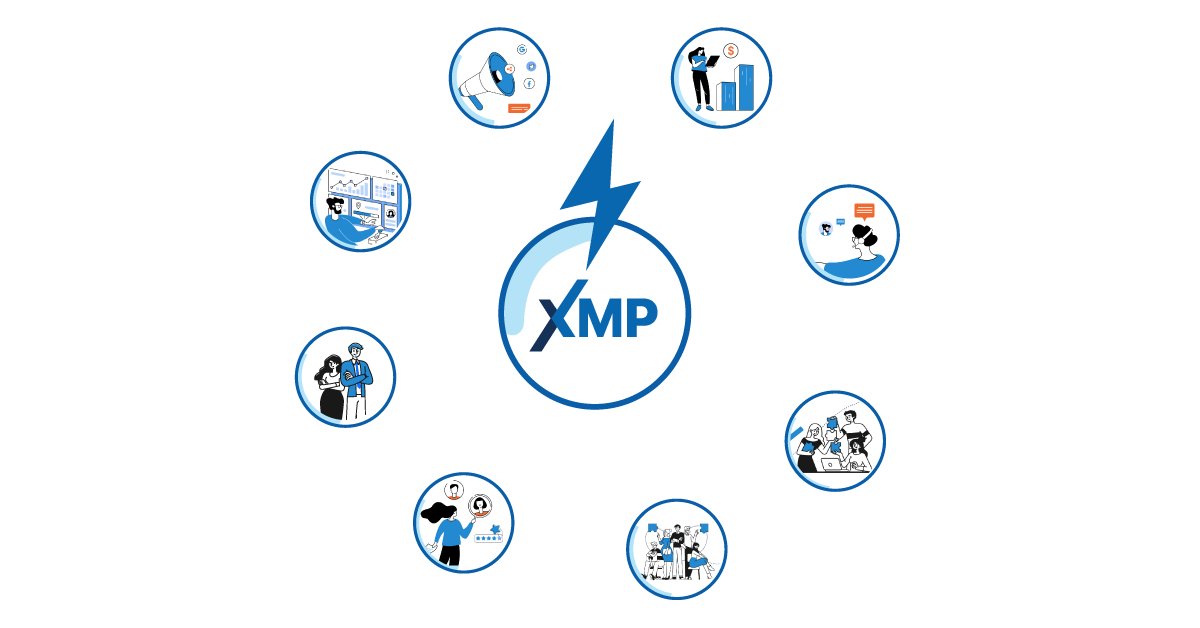Experience management collects customer feedback at every meaningful moment. You can analyze that feedback and use the insights to implement programs that improve customer experiences, strengthen your brand, increase customer loyalty and retention, and more. You are probably aware of the advantages of experience management in areas of your company like customer success. What you might not know is that experience management offers benefits to every corner of your company. Let’s explore how, starting with marketing and going through your organization to the C-suite.
Marketing: Understand the customer better
Qualified inbound leads, on-target campaigns and messaging, successful product and service launches, and positive sentiment about your brand all require extensive information about customers. Marketers need to understand customer thoughts, feelings, and behavior to design programs that increase leads and build pipelines. Marketing benefits from experience management because it supplies customer insights and understanding. The customer journey becomes clearer. Sharing positive reviews of your CX on social media enhances your brand’s reputation. High-quality reviews also improve visibility in search engine results and SEO ranking, increasing the likelihood that a potential customer will visit your website, download content, or engage in a chat.
Sales: Make every interaction meaningful
Your sales teams are under constant pressure to drive top-line revenue, scale your client portfolio, and build your company and individual brands. They continuously interact with customers and prospects, and they need to ensure these experiences are meaningful to land deals and then grow them. Experience management can capture CX at every key moment where the team interacts with clients. It helps sales teams see how they can boost performance and awareness. It can also show the team what they can do to make sure your company is chosen over competitors.
Call Center: Solve problems to everyone’s satisfaction
The call center is on the front lines of customer service. Sometimes it is the first time a customer interacts with a person representing your company. Everyone in the call center knows how important experience is, and teams are expected to continually field questions and present prompt solutions. Call centers need customer feedback in real-time, and they also need information that can be used to coach effectively and motivate the team to deliver greater customer satisfaction. A call center can use experience management to capture representative performance as it is happening and motivate representatives with performance leaderboards and rewards for outstanding experiences. It can also help the call center devise ways to resolve customer issues more quickly.
Support and Success: Smooth out the customer journey
Support and success interact with customers every day, so they are key ambassadors for your brand, and they are also where loyalty and repeat sales begin. To ensure that they do not break the customer experience and send customers to competitors, they must respond to customer issues effectively. Support needs information and understanding about the customer journey to deliver the best and most seamless experiences possible. It also needs to decrease support tickets wherever possible. Experience management provides the data and escalation workflows for in-the-moment alerts and customer journey data to ensure the team is high-performing and engaged.
Human Resources: Build an intentional, engaging culture
You might be wondering how human resources, which focuses on internal experiences, relates to customer experience. The answer is that HR is the engine for not only empowering employees to do their best to provide exceptional CX but also ensuring that employee experiences (EX) are encouraging and positive. HR needs data and feedback that can help motivate and coach employees to support business goals, interact with customers, and build employee reputation to attract top talent. With experience management, HR can track the CX efforts of employees and capture and act on EX at every point of their journey. It can help them boost and improve customer engagement, increase retention, and optimize recruitment efforts.
CXO and Experience: Develop, execute, and improve CX
Your company has CX and EX goals, which likely include decreasing friction in customer and employee journeys, engaging multiple departments in CX improvement programs, and getting everyone’s buy-in. Your CXO and Experience leadership need to measure the impact of CX on employees, the impact of EX on customers, and the impact of both on the company’s KPIs. They also need to oversee the process of rolling out and scaling a full enterprise program to support your company’s goals. Experience management enables your CxO and Experience leadership to gather customer and employee experience data automatically, use that data to act immediately, and improve overall brand perception.
Technology: Deliver systems and tools that power experiences
Technology underpins everything you do to improve CX. Your technology or IT team is under pressure to select technology that integrates with existing systems, drive revenue with technical solutions, create a cohesive and scalable tech stack, reduce manual processes, and break down department silos. They must strategically define and manage the systems and tools that power all departments, improve efficiency, create seamless CX, and increase revenue. Experience management provides your tech and IT teams with the information and feedback they need to make the right tech decisions for the company and make sure every department has applications and software that help them deliver exceptional, frictionless CX.
CEO and COO: Make data-driven decisions about experience
Your CEO and COO need to meet business goals and drive revenue, while ensuring departmental connectivity and performance. Outstanding customer care can be the differentiator that accelerates growth and creates lifelong customers, but operationalizing CX is a challenge. Experience management enables CEOs and COOs to drive behavior, increase retention, and ensure the operations team is providing outstanding experiences. Experience management also features robust reporting and analytics that CEOs and COOs can use to make data-driven decisions tied to the customer journey that grow your business.
Ready to learn more?







